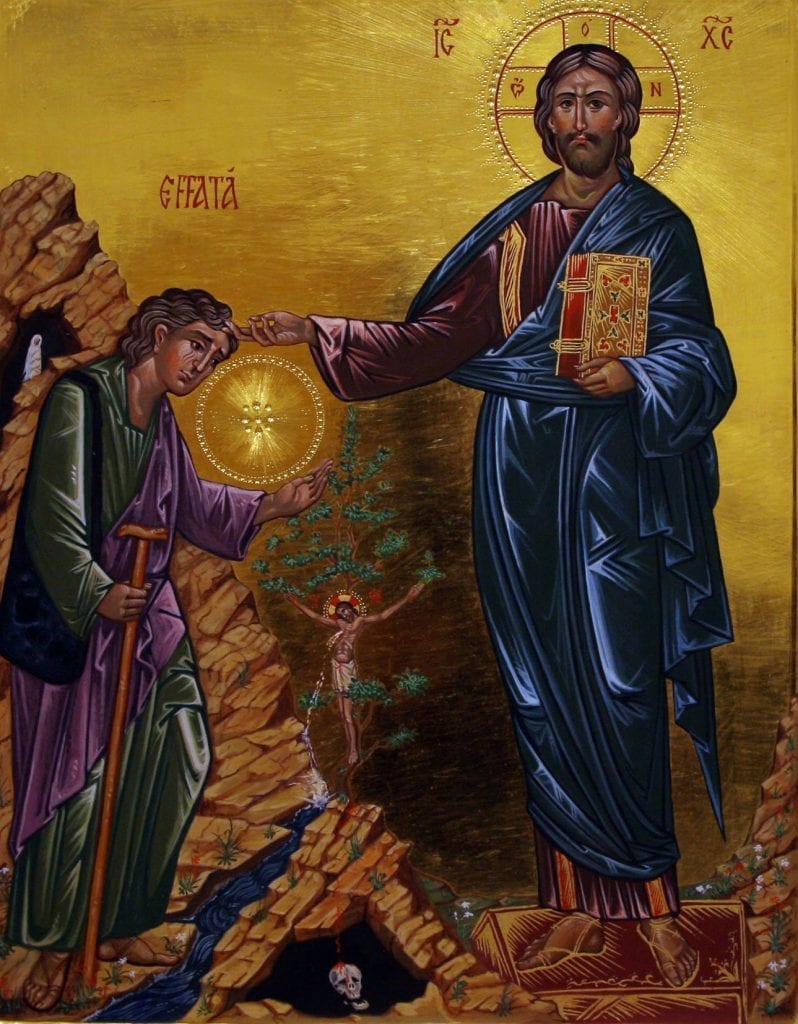HOMILY: Theophany – A day of illumination – January 19, 2020
Readings: Matthew 2:1-12, Isaiah 60:1-6
Thus ends the twelve days of Christmas! Having just celebrated the birth of Christ our Savior, our God and our King, here marks the beginning of Christ’s ministry on earth. Today is a day of illumination, the revealing of God the Son incarnate in the flesh, and the revealing of the triune God: Father, Son, and Holy Spirit. This is a day that predates our celebrations of Christmas, preserved from the second century. It is also a public holiday in a number of European nations. If only we could be so lucky.
This is a feast which I find to be somewhat unique in the life of those Orthodox Churches who celebrate the western rite. It is a multi faceted feast day, whose focus of celebration and remembrance differs depending on the direction you are facing. In the western traditions, this particular feast day is referred to as the day of epiphany, where the day is identified with the visit of the Magi in Bethlehem to behold the Christ child, to which the star in the east had led them. This is the event foretold in our lesson from Isaiah:
“A multitude of camels shall cover you, the young camels of Midian and Ephah; all those from Sheba shall come. They shall bring gold and frankincense, and shall bring good news, the praises of the Lord.”
Isaiah 60:6
On this day, through the visitation of the Magi, is celebrated the physical manifestation of God incarnate in the flesh, and His revelation to the Gentiles. The Magi were the first Gentiles to whom He was revealed, but this is not a revelation they could have come to on their own, for they were teachers of a false faith. They had been illumined by the grace of God overflowing from the birth of Christ. As Saint John Chrysostom has said, “The Magi are enlightened so that the goodness of God may be made manifest: so that no one need despair, doubting that salvation through faith will be given to him, seeing He bestowed it on the Magi. The Magi therefore were the first from the Gentiles chosen for salvation, so that through them a door might be opened to all the Gentiles.”
Today is a day of illumination, or more appropriately a celebration of illumination. We remember the illumination of the Magi in the west, but we also remember our own illumination in the east, wherein the focus of this day – the Feast of Theophany – is centered on the Baptism of our Lord and God and savior Jesus Christ in the waters of the Jordan river. This is the day that Christ made himself known to all mankind, for the people had not yet known him. It is also upon this day that the Holy Church asserts its faith in the mystery – most noble and incomprehensible to the rational mind – of the Three Persons of the triune God. Jesus Christ ascended out of the waters of Baptism, the Holy Spirit descending upon him in the form of a dove, with the voice of the Father echoing from above, unseen, “this is my beloved Son, in Whom I am well pleased.” Jesus Christ, having no need of cleansing, having no sin to be cleansed of, and being born of a Virgin and without the corruption of Adam’s sin, was baptized in the waters of the Jordan not for His sake, but for our own. Christ descended into the waters of the Jordan that all the waters of creation may be sanctified for our sake, for our own purification and cleansing of sin through our own baptism. His baptism is our baptism. His life is our life. His death is our death, and His resurrection is our resurrection.
By our baptism, cleansed of our sin and joined to Jesus Christ, we renounce the world and live a new man. So, it is not unreasonable for us to remember our own baptism on this day, remembering the vows we took, or were given on our behalf if one was blessed enough to be born into the Church. It is within these vows, as Metropolitan Philaret (Voznesensky) has said:
“…in which a Christian has promised God to renounce Satan and all his works and to join himself, to unite himself with Christ, these vows are not only forgotten by people, but many in general know nothing about them or about the fact that these vows were pronounced for them and that they ought to think a little about how they must fulfill [them]… One thing is needful – only one thing is necessary – and to remember that we must join ourselves with Christ, that is, not only fulfill His commandments, but also endeavor to unite ourselves with Him.”
Metropolitan Philaret (Voznesenksy) – Holy on Theophany.
He further exhorts us later in his Homily to think and remember what it means to each of us to renounce Satan and all his works; that we may join ourselves to Christ. We do this through the process of theosis, which we began through our own baptisms, when we were purified of our sins, and purified of all the defilements of this world. Having been cleansed, we began “the perfecting of Holiness in the fear of God,” just as Saint Paul exhorts in his second letter to the Corinthians. Holiness is achieved through the path and process of Theosis, a path which begins in the Church, for the Church is Christ, and He is “the way and the Truth and the life.”
The Church is humanity illumined; a humanity baptized in the grace of God; a humanity illumined by the beauty of its creator; a humanity illumined and healed by His dignity – our own dignity restored – God becoming man that we may become more like Him; a humanity illumined in His beauty, that we may incarnate His beauty into the world, becoming living icons of truth; and a humanity illumined by the Light of Life, that we may shine like morning stars, and lead others to the truth just as the Magi were led to Christ.
Theosis presupposes life within the Church, the body of Christ; the body of illumined humanity. We enter it by following Christ through the waters of baptism, and together are illumined by the same Spirit that sanctified them. It is within the Church that we become a part of, and partake of, the body of Christ. It is within the Church in which we partake of the sacraments, that which is necessary to acquire the sanctifying spirit and be transformed into the divine likeness of God. It is within the Church that we come into communion with Christ, and so participate in the divine worship of the Church triumphant, the Church militant being the living icon of that Church in heaven, the living icon of Christ. It is within the Church that the meaning of the scriptures are revealed to us. It is in the Church alone that the truth is revealed to us, and the means necessary to our salvation are provided to us. The Church is taught by the Holy Spirit, and there exists an indissoluble unity between God and His Church, for “The Church is the earthly heaven in which the heavenly God moves and dwells.” We must choose to be where God is, in striving towards a unity of spirit.
Christ’s baptism on the Jordan River revealed this unity of spirit, the unity of God the Father, God the Son, and God the Holy Spirit. The Theophany illumined all of creation with the revelation of the Triune God: God in three persons, yet one essence; three wills, and two natures; infinite and present in all things, yet udivided; ineffable, yet knowable through Jesus Christ, our King and our God. Christ’s baptism opened the door to follow him into unity with Him as living stones within the Church provided by his honorable blood. This Church confesses and asserts our faith in the mystery of the Trinity. It teaches to confess and glorify with equal honor and divinity each person of the Godhead. It reveals and renders impotent the teachings of those wherein finite and human terms attempted to describe the Creator of all things. It establishes for us the place, importance, and necessity for our own baptism, a gift and grace of God granted unto us by the Holy Spirit, for “as many as have been baptised into Christ have put on Christ.”
The world changed when Christ rose from the waters of the Jordan: the waters of creation were sanctified, the divinity of Christ was revealed, the triunity of God was made manifest unto men, and Christ went forth to begin his ministry. Christ left the waters the same as He entered into them: God the Son incarnate in the flesh; yet, everywhere he went, the fire of God’s love molded the very hearts of men. So, go and do likewise.
By the prayers of our holy fathers and mothers, and Lord Jesus Christ our God, have mercy on us and save us.
Amen.










